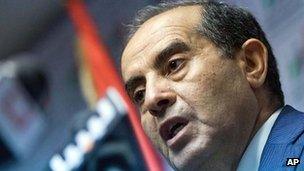Profile: Mahmoud Jibril
- Published

As interim prime minister, Mahmoud Jibril was one of the most high-profile figures in the conflict that ousted long-time leader Muammar Gaddafi.
That prominence appears to have paid off at the ballot box, with election results showing his National Forces' Alliance leading in the country's first democratic vote in decades.
There is speculation that he will have a key future position, possibly as president, in the post-Gaddafi era.
Due to election laws banning members of the ruling National Transition Council (NTC) running for parliament, he was not a contender himself.
Western-educated and English-speaking, Mr Jibril is credited by some with helping win support for Libya's then opposition last year.
His supporters regard him as someone who can unify the country at a time of uncertainty, as Libya seeks to emerge from its brutal conflict. The 60-year-old is also seen as a safe pair of hands to rebuild Libya's oil economy.
His defection to the rebel National Transitional Council at the beginning of last year's revolution was well-timed, pushing him into the spotlight. He served as prime minister for the NTC until October 2011, when he fulfilled a pledge to resign after Libya was "liberated".
But critics have expressed discomfort with his links to the Gaddafi regime. Before his defection, Mr Jibril acted as head of the National Economic Development Board (NEDB) - a position into which he claims he was strong-armed.
Born in 1952, Mr Jibril has both a master's degree in political science and a PhD in strategic planning and decision-making from the University of Pittsburgh in Pennsylvania.
After completing his doctorate in 1984, he taught strategic planning and decision-making at the university for several years. He also wrote several books and ran leadership training programmes in several Arab states.
He later became the head of the Libyan National Planning Council.
In 2009, he was given his position as chairman of the NEDB, which was founded in the mid-2000s to encourage investment in Libya. He reported directly to the prime minister.
A leaked US diplomatic cable from November 2009 written by the US ambassador to Libya, Gene Cretz, described Mr Jibril as "a serious interlocutor who 'gets' the US perspective".
"He is also not shy about sharing his views of US foreign policy, for example, opining that the US spoiled a golden opportunity to capitalise on its 'soft power' (McDonald's, etc) after the fall of the Soviet Union in 1989 by putting 'boots on the ground' in the Middle East," Mr Cretz wrote.
An earlier US diplomatic cable described Mr Jibril as "reform-minded".
Before the uprising, he was involved in a project called "Libyan Vision" with other intellectuals, which sought to establish a democratic state.